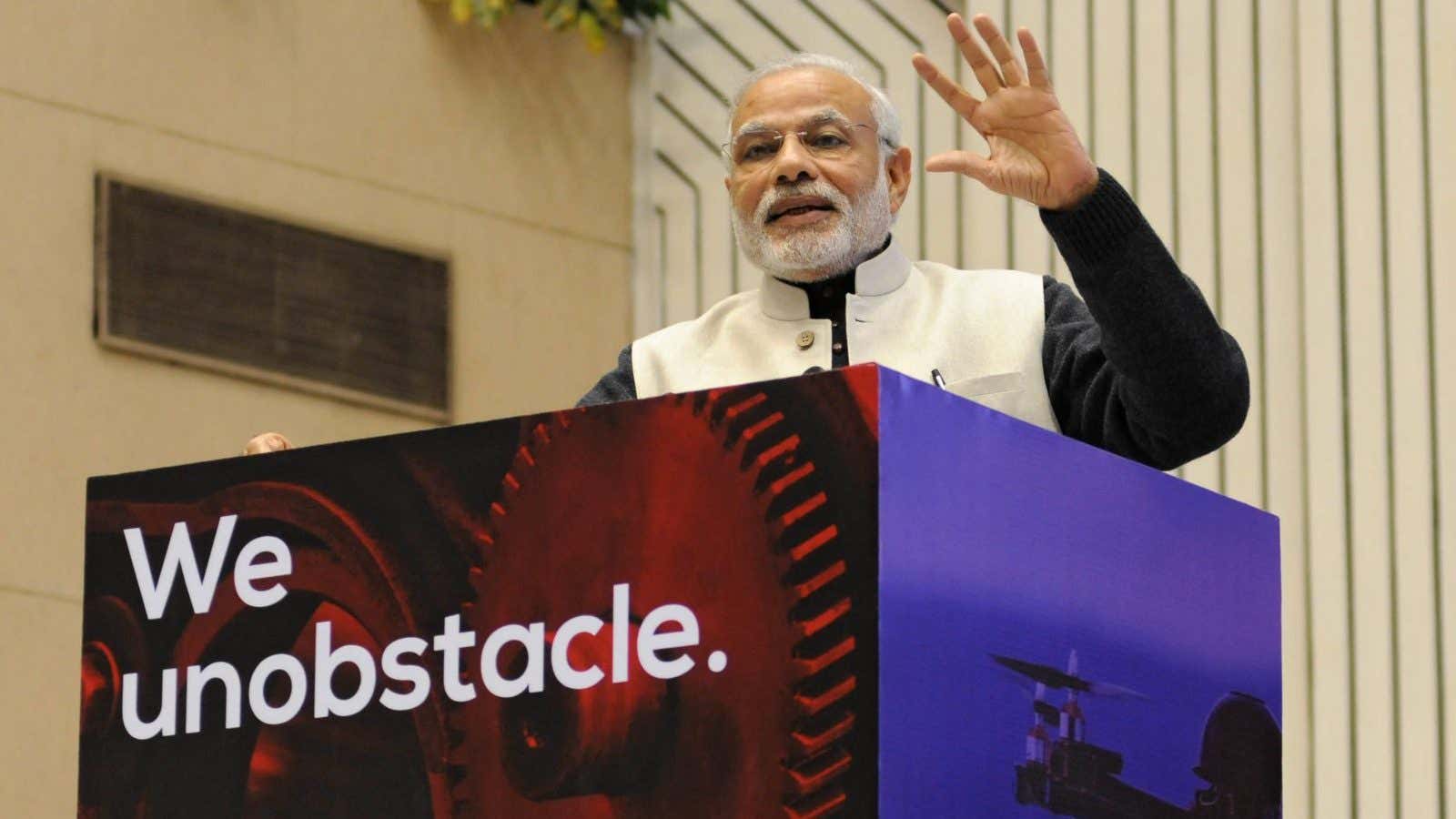India is home to over 20,000 startups, but few are even aware of the benefits of the government’s ambitious Startup India programme.
On Jan. 16, 2016, Narendra Modi launched the Startup India Action Plan amid much fanfare. Addressing an audience of over 1,500 entrepreneurs and investors on that day, the prime minister announced a gamut of benefits for startups ranging from tax exemptions and faster processing of documents to funding and mentorship.
The initiative was touted to be a game-changer in the world’s third-largest startup ecosystem. But it didn’t seem to stir much except the wind.
Two years on, only a handful of entrepreneurs have actually benefited. Even to those whom the initiative has been helpful, it’s been largely limited to getting publicity and networking.
Quartz spoke to over a dozen startups, investors, and industry experts to see what has changed since.
Blissfully ignorant
The Startup India Hub website lists over 3,800 firms under its “ecosystem.” Some of those whom Quartz reached out to were surprised they were on the list.
Several entrepreneurs from Chennai, Bengaluru, and New Delhi, while aware of Startup India, said they “don’t really know much about the benefits” of registering for it.
“If I talk to, say, 100 startups, only five will be aware of what (the) Startup India initiative is. While they’ve vaguely heard of it, they’ve not really understood it. At the street level the knowledge is still low,” Vikas Kumar, co-founder of LoanTap, an online platform that provides loans to salaried individuals, told Quartz. LoanTap is registered with Startup India.
A recent survey by community-based social networking site LocalCircles reflects a similar sentiment.
“The kind of motivation I got (from the Startup India launch event)…that’s the only thing I’ve received,” Nav Agarwal, co-founder of Clip App, a nine-month-old digital media app, said.
Many startups, however, did register. For instance, there is the online technical learning platform, Guvi, which joined the herd. But its founder Arun Prakash says there’s been no movement in the programme since then.
“We were invited to the launch of (the) Startup India programme and that’s about it,” said Siva Devireddy, founder of e-commerce marketplace GoCoop, which, too, figures on the Startup India Hub website.
Meanwhile, many firms that qualify for the benefits have stayed away, thanks to the cumbersome process, said Madhukar Sinha, co-founder of early-stage investment firm India Quotient.
Moreover, promises of tax exemptions or incubation support have not yet translated into reality, experts believe.
The tax benefits or the Rs10,000 crore (approximately $1.5 billion) Fund of Funds for Startups (FFS) set up by the government have not enthused many either. A mere 10% of the Rs10,000 crore has been disbursed so far, out of which some “75 startups have received funding to the tune of Rs. 337.02 crore,” CR Chaudhary, minister of state for commerce and industry, stated in a written response to a question in the Lok Sabha on Dec. 18, 2017.
On Jan. 16, the department of industrial promotion and policy (DIPP) said it intends to plow more money into the FFS, bringing the total investment amount up to Rs2,200 crore ($346 million).
Overall, the initiative has been of help to few in terms of funding.
The lucky few
However, some hit the jackpot—and can’t stop raving about it. They are excited more about the publicity and networking benefits they have got till now.
“We get to connect with the right person in the department (DIPP), and also they help you in promoting your product,” said Manoj Meena, the founder of Atomberg Technology, a startup that makes energy-efficient ceiling fans.
The company sells electrical equipment that requires several certifications from government agencies, and being part of the network has helped it hasten that process, he said. Atomberg is also assigned an advisor from the Startup India team who they can tap any time for advice on government schemes.
“There’s been much more handholding,” Kumar of LoanTap said.
Being a Startup India member has also given companies credibility. “I see a distinct difference in the way funds are now behaving with us than (how) they used to behave earlier,” Kumar said.
Scope for improvement
While the government has ambitious plans, including bringing in more money and women entrepreneurs into the ecosystem, it needs to iron out a lot of kinks.
For starters, there’s the need to create more awareness about the programme. ”We don’t know if tech-based startups qualify (for the benefits) or if it is only for hardware startups,” Agarwal of Clip App said.
Besides, the current benefits are applicable only for companies that are already making money.
“A lot of incubation has to happen. A lot of people initially have fantastic ideas but they drop the idea because of a lack of even very small amounts of capital. If one gets the smallest of support through incubation centres, that would help,” Vipin Pathak, founder of healthcare startup Care24, registered under Startup India, said.
One aspect that entrepreneurs seek clarity on is taxation. During the launch, Modi had promised exemptions on investments above fair market value, which is the estimated market value that a buyer will be willing to pay for a startup. But confusion remains.
“Everybody knows it is a thorny issue and every startup has the same problem because every investment is above fair market value,” Kumar of LoanTap said. “So even if the government did nothing, and sorted this issue out, it would be amazing. This particular issue the government should have taken much more seriously than they have.”
